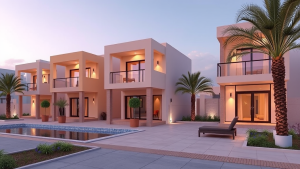The financial benefits of low fuel prices: how saving €95 monthly in Hurghada impacts local residents
Residents of Hurghada are feeling the positive impact of low fuel prices, with an average savings of €95 monthly. This reduction in fuel costs not only eases the financial strain on local families but also creates ripples throughout the community and economy.
When fuel prices drop, it results in significant changes in daily life. With €95 extra in their pockets each month, families in Hurghada can allocate these funds towards essential needs and local experiences. Here are some insightful benefits of these savings:
- Increased Disposable Income: Savings from low fuel prices mean more money for necessities. Families can afford better quality food, clothing, and other essentials without feeling the pinch. This inflow of cash can also empower residents to save for emergencies or future needs.
- Boost to Local Businesses: When residents have more disposable income, local businesses in Hurghada can thrive. From restaurants and shops to entertainment venues, these establishments see increased patronage. The added revenue can lead to enhanced services and even job creation.
- Improved Quality of Life: More disposable income often translates to enhanced leisure activities. Families can go out more often, take day trips, or engage in recreational activities, significantly enhancing the overall quality of life in the area.
- Encouragement of Sustainable Practices: With lower transportation costs, more individuals may opt for carpooling or using public transport. This shift reduces traffic congestion and promotes a more sustainable lifestyle, benefiting the environment.
- Potential for Investment: Saving €95 monthly can lead to better investment opportunities. People might consider putting that money into home improvements, educational courses, or savings for travel, which can greatly enrich their lifestyles.
Moreover, the monthly savings can stimulate the local economy in ways residents might not immediately realize. For example, as more people dine out or shop locally, businesses grow, creating jobs and encouraging new businesses to open. Community events, festivals, and markets can also flourish with this increased economic activity, leading to a vibrant local culture.
This consistent savings can aid residents in managing their finances more effectively. Budgeting becomes a more accessible task when essential expenses, such as fuel, decrease. Families may find it easier to set aside money for long-term goals like vacations, home ownership, or education for their children.
These financial benefits encompass not only individual households but also extend to larger community benefits. More circulation of money within Hurghada can lead to a stronger economy, characterized by resilience and growth. Less reliance on imported goods and services can help stabilize local prices, further sustaining low fuel costs’ positive effects.
The knock-on effect of saving on fuel prices can touch various aspects of residents’ lives. To further illustrate this, consider these specific scenarios:
- A family can choose to spend their saved €95 on a monthly family outing, strengthening bonds and improving mental health through shared experiences.
- Individuals might have more freedom to pursue hobbies, such as cooking or sports, which can lead to healthier lifestyles and increased satisfaction.
- Families can treat themselves to better educational resources for their children or even save towards higher education, nurturing the future generation.
In this way, the financial benefits of low fuel prices create an environment of growth, wellbeing, and stability. Residents of Hurghada are in a fortunate position where saving €95 a month from fuel can foster both personal and community development.
While the immediate effect of low fuel prices is the financial relief of €95 monthly, the underlying benefits promote a prosperous lifestyle for local residents in Hurghada. Whether it’s through enriched family life, bolstered local businesses, or enhanced community offerings, the impact of lower fuel prices resonates profoundly, proving that every cent counts.
The environmental implications of low fuel prices in Hurghada and their influence on sustainable practices
The surge in low fuel prices in Hurghada, averaging €95 monthly, offers many immediate benefits to residents and tourists alike. However, the environmental implications of these low prices are significant and deserve a closer examination. While affordable fuel seems advantageous, it can inadvertently influence behaviors and choices that may not align with sustainable practices.
When fuel prices drop, individuals are often encouraged to use their cars more frequently. This uptick in vehicle use can lead to increased carbon emissions, contributing to air pollution and climate change. In a tourist-savvy location like Hurghada, where the economy heavily relies on both local residents and vacationing visitors, this increase in carbon footprints can have lasting effects.
One major concern is the possible decline in the use of sustainable transport options. As fuel becomes cheaper, you might find it less appealing to opt for greener alternatives like bicycles, scooters, or public transport. Unfortunately, the convenience of hopping into a car becomes more attractive when costs are lowered. This creates a cycle of dependency on fossil fuels, counteracting many efforts toward sustainability.
- Increased vehicle usage due to low fuel prices.
- Decline in public transport and shared ride initiatives.
- Promotion of less environmentally friendly travel habits.
Additionally, the reliance on fuel also translates into a higher demand for personal vehicles. This demand can lead to a surge in manufacturing vehicles, further straining natural resources. The production of vehicles is energy-intensive, and the more cars that are produced, the more fossil fuels are utilized in their manufacturing process. As you can see, low fuel prices can have a ripple effect, promoting consumption that ultimately harms the environment.
In Hurghada, the delicate balance between tourism and environmental conservation is constantly in motion. Cheap fuel can lead to an influx of tourists who wish to explore the beautiful area by car, contributing to traffic congestion and environmental degradation. This influx requires more road maintenance and the expansion of infrastructure, which can disrupt local ecosystems and habitats. A significant increase in vehicular traffic can also impact wildlife, particularly in urban areas where natural habitats are already at risk.
Another aspect to consider is the impact on energy dependence. As fuel prices decrease, policymakers may feel less inclined to invest in alternative energy or sustainable practices. If immediate financial relief is available through cheap fuel, long-term strategies for sustainable energy might take a backseat.
- Encouragement of local policymakers to invest less in sustainable energy.
- Potential stagnation of environmentally-friendly initiatives and programs.
- Reduced community efforts towards green practices.
Furthermore, industries relying on transportation and logistics may take advantage of low fuel prices without regard for the environmental consequences. For instance, businesses may choose to ship products with a higher carbon footprint, transforming operations that once focused on sustainability into ones solely driven by profit margins. As a result, the negative ramifications on air quality and climate change escalate.
To mitigate these repercussions, it’s crucial for both you and local governments in Hurghada to adopt strategies that encourage sustainable practices alongside the benefits of low fuel prices. Here are some recommendations:
- Promote the use of public transportation through incentives and improved services.
- Encourage carpooling and shared rides among residents and tourists.
- Increase awareness of the environmental impacts of increased vehicle usage.
- Support local businesses that prioritize eco-friendly practices.
Moreover, education plays a crucial role in shifting mindsets. Providing resources and workshops promoting sustainable practices can inspire individuals and communities to strive for greener lifestyles while still benefiting from low fuel prices. When people understand the implications of their choices, they may be more inclined to consider the environmental impact of their habits.
While the savings from low fuel prices present tangible advantages to Hurghada’s economy, they also provoke significant environmental challenges that require careful consideration. By prioritizing sustainable practices and mindful consumption, individuals and policymakers alike can align their immediate benefits with long-term ecological responsibility.
Understanding the financial benefits of low fuel prices in Hurghada reveals just how impactful saving €95 monthly can be for local residents. Not only does this significant reduction in fuel costs free up more disposable income for families, but it also contributes to the overall economic stability of the community. With these savings, residents can allocate funds toward essential needs, recreational activities, or even small businesses, fostering a cycle of local economic growth.
Moreover, the environmental implications of these lower fuel prices cannot be overlooked. By making transportation more affordable, residents may be encouraged to rely on public transport options or more energy-efficient vehicles. This shift reduces carbon footprints and creates a more eco-friendly atmosphere in Hurghada. As the community embraces sustainable practices, the benefits of low fuel prices extend beyond immediate financial relief and foster a culture of environmental responsibility.
Together, these factors paint a hopeful picture of Hurghada, where a financial advantage transforms into a broader commitment to sustainability. The balance of economic growth and environmental care is essential for the long-term well-being of the city and its inhabitants. By continually optimizing the benefits of affordable fuel, residents can champion healthier lifestyles while also contributing to the preservation of their stunning surroundings. As a result, low fuel prices are not just an economic advantage but a step toward a more sustainable and prosperous future for all in Hurghada.












